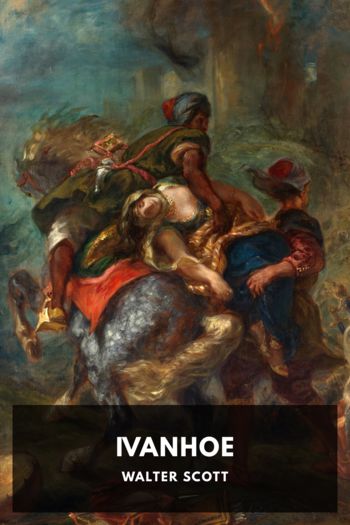Ivanhoe - Walter Scott (bookreader txt) 📗

- Author: Walter Scott
Book online «Ivanhoe - Walter Scott (bookreader txt) 📗». Author Walter Scott
“So may Abraham, Jacob, and all the fathers of our people assist me,” said Isaac, “I cannot make the choice, because I have not the means of satisfying your exorbitant demand!”
“Seize him and strip him, slaves,” said the knight, “and let the fathers of his race assist him if they can.”
The assistants, taking their directions more from the Baron’s eye and his hand than his tongue, once more stepped forward, laid hands on the unfortunate Isaac, plucked him up from the ground, and, holding him between them, waited the hardhearted Baron’s farther signal. The unhappy Jew eyed their countenances and that of Front-de-Boeuf, in hope of discovering some symptoms of relenting; but that of the Baron exhibited the same cold, half-sullen, half-sarcastic smile which had been the prelude to his cruelty; and the savage eyes of the Saracens, rolling gloomily under their dark brows, acquiring a yet more sinister expression by the whiteness of the circle which surrounds the pupil, evinced rather the secret pleasure which they expected from the approaching scene, than any reluctance to be its directors or agents. The Jew then looked at the glowing furnace, over which he was presently to be stretched, and seeing no chance of his tormentor’s relenting, his resolution gave way.
“I will pay,” he said, “the thousand pounds of silver—That is,” he added, after a moment’s pause, “I will pay it with the help of my brethren; for I must beg as a mendicant at the door of our synagogue ere I make up so unheard-of a sum.—When and where must it be delivered?”
“Here,” replied Front-de-Boeuf, “here it must be delivered—weighed it must be—weighed and told down on this very dungeon floor.—Thinkest thou I will part with thee until thy ransom is secure?”
“And what is to be my surety,” said the Jew, “that I shall be at liberty after this ransom is paid?”
“The word of a Norman noble, thou pawn-broking slave,” answered Front-de-Boeuf; “the faith of a Norman nobleman, more pure than the gold and silver of thee and all thy tribe.”
“I crave pardon, noble lord,” said Isaac timidly, “but wherefore should I rely wholly on the word of one who will trust nothing to mine?”
“Because thou canst not help it, Jew,” said the knight, sternly. “Wert thou now in thy treasure-chamber at York, and were I craving a loan of thy shekels, it would be thine to dictate the time of payment, and the pledge of security. This is my treasure-chamber. Here I have thee at advantage, nor will I again deign to repeat the terms on which I grant thee liberty.”
The Jew groaned deeply.—“Grant me,” he said, “at least with my own liberty, that of the companions with whom I travel. They scorned me as a Jew, yet they pitied my desolation, and because they tarried to aid me by the way, a share of my evil hath come upon them; moreover, they may contribute in some sort to my ransom.”
“If thou meanest yonder Saxon churls,” said Front-de-Boeuf, “their ransom will depend upon other terms than thine. Mind thine own concerns, Jew, I warn thee, and meddle not with those of others.”
“I am, then,” said Isaac, “only to be set at liberty, together with mine wounded friend?”
“Shall I twice recommend it,” said Front-de-Boeuf, “to a son of Israel, to meddle with his own concerns, and leave those of others alone?—Since thou hast made thy choice, it remains but that thou payest down thy ransom, and that at a short day.”
“Yet hear me,” said the Jew—“for the sake of that very wealth which thou wouldst obtain at the expense of thy—” Here he stopped short, afraid of irritating the savage Norman. But Front-de-Boeuf only laughed, and himself filled up the blank at which the Jew had hesitated.
“At the expense of my conscience, thou wouldst say, Isaac; speak it out—I tell thee, I am reasonable. I can bear the reproaches of a loser, even when that loser is a Jew. Thou wert not so patient, Isaac, when thou didst invoke justice against Jacques Fitzdotterel, for calling thee a usurious bloodsucker, when thy exactions had devoured his patrimony.”
“I swear by the Talmud,” said the Jew, “that your valour has been misled in that matter. Fitzdotterel drew his poniard upon me in mine own chamber, because I craved him for mine own silver. The term of payment was due at the Passover.”
“I care not what he did,” said Front-de-Boeuf; “the question is, when shall I have mine own?—when shall I have the shekels, Isaac?”
“Let my daughter Rebecca go forth to York,” answered Isaac, “with your safe conduct, noble knight, and so soon as man and horse can return, the treasure—” Here he groaned deeply, but added, after the pause of a few seconds—“The treasure shall be told down on this very floor.”
“Thy daughter!” said Front-de-Boeuf, as if surprised—“By heavens, Isaac, I would I had known of this. I deemed that yonder black-browed girl had been thy concubine, and I gave her to be a handmaiden to Sir Brian de Bois-Guilbert, after the fashion of patriarchs and heroes of the days of old, who set us in these matters a wholesome example.”
The yell which Isaac raised at this unfeeling communication made the very vault to ring, and astounded the two Saracens so much that they let go their hold of the Jew. He availed himself of his enlargement to throw himself on the pavement, and clasp the knees of Front-de-Boeuf.
“Take all that you have





Comments (0)